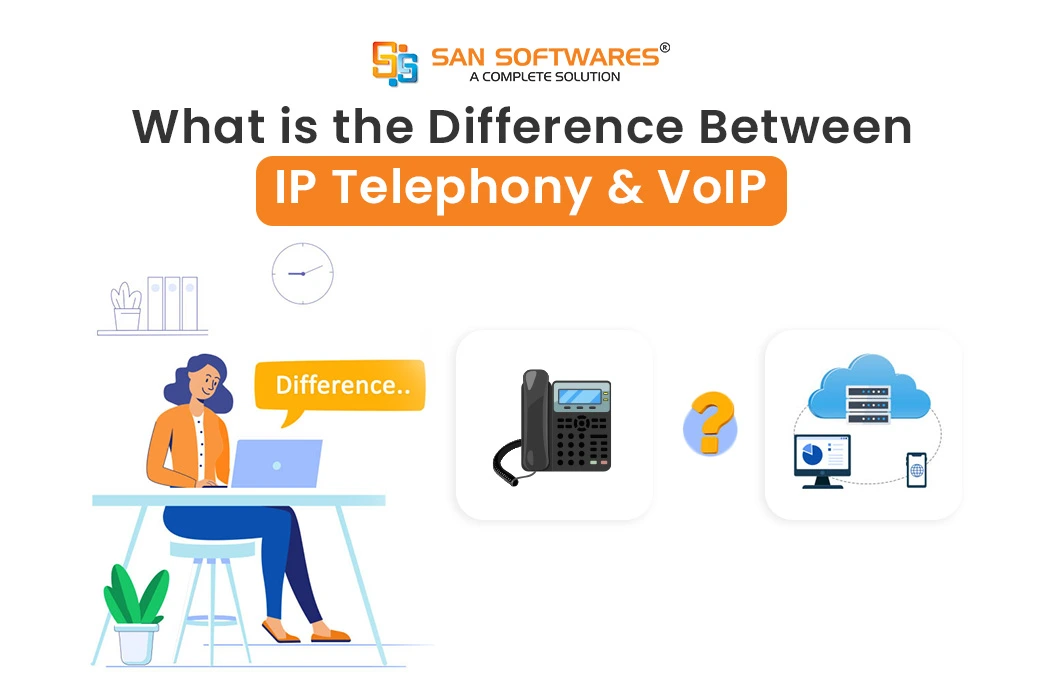
Are you a business owner looking for an efficient and cost-effective office phone system? Then, you must have heard about IP Telephony and VoIP (Voice over Internet Protocol). You must imagine how they are different from each other.
If you look at the basic level, IP Telephony and VoIP are not very different. They let you make calls using the Internet instead of regular phone lines. Yes, there are some differences that you should be more aware of to ensure the right use of technology at the right place.
In this blog, we will explain and help you understand their meaning and benefits.
Before we dive in, let’s understand the meaning of these phone systems.
IP telephony is a general term that encloses the technologies, products, and services, that use IP to support various modes of communication. These include normal voice calling, video calling, instant messaging, and faxing. Traditionally, if you see communication used dedicated phone lines or circuit-switch connections. With this, calls are even more easy and they are now converted into data packets and sent over the internet, removing the need for a dedicated line to make communication faster and more efficient.
VoIP (Voice Over Internet Protocol) is a type of IP telephony that mainly deals with voice calls. It works by turning audio signals into digital data, transmitting them over the internet, and then converting them back into sound on the receiver’s end for playback. VoIP is a choice for many businesses because it is more affordable than traditional phone services. This allows calls to be made on wired and wireless connections, offering flexibility with advanced features, like call forwarding and voicemail.
As we have mentioned earlier, IP telephony and VoIP are closely related to each other, however, there are a few things that differentiate them. Let’s understand:
Like we said before, IP telephony covers a bunch of different communication technologies. It includes components IP PBX (Internet Protocol private branch exchange) System and SIP (Session Initiation protocol). It allows you to manage multiple phones from a single device not only that with the help of SIP facilities, you can also manage multimedia facilities.
Meanwhile, VoIP only focuses on voice calls which are supported by Internet.
No, both are not at all costly compared to traditional phone systems. Why?
Because IP telephony is comprehensive, though it needs one-time investments. However, long-term cost savings are for the greater good. But, VoIP? Yes, it is also a budget-friendly option if your business doesn't need added services but just the voice.
IP telephony needs a data network, such as a wide area network (WAN), local area network (LAN), or just the internet, to carry communication traffic.
VoIP, however, uses the internet as its main way to send voice calls.
Both are highly scalable with a wide range of capabilities and features.
IP telephony is highly scalable, but the process of adding or removing users might require little effort, depending on what company you choose to be as your software. VoIP is easier generally simple to use and scalable too. It is easy to remove user details with minimal disruption to the service.
If you're setting up IP telephony for your office that includes VoIP, you’ll have a virtual phone system that isn't stuck to one physical place. It means you can make and receive calls from a device, anywhere in the world.
VoIP on the other hand is more flexible since it doesn’t need any hardware or infrastructure. It is easier and portable, making it an option for business needs and connections while you travel anywhere.
When you are deciding between IP Telephony and VoIP for your business of any size, do consider your specific requirements and budget. If you need a comprehensive Office Telephony system like SanIPPBX with advanced features, then IP Telephony is the right choice for your business for all sizes, not only you can easily install it in Housing Societies, Hospitals, Education industries, etc. for advanced communication. However, if you need flexibility and just voice capabilities, the take VoIP is for you.
Consulting with an expert like SAN Softwares can help you select the most appropriate setup for your business.
Schedule a demo with Us to get started.
As you can see, VoIP is a flexible, reasonably priced solution that includes voice mail and call forwarding. However, IP telephony is extensive and encompasses both internal and external business systems in addition to voice calls. That is why majority of organizations favor IP telephony, although it may be more expensive than VoIP, the investment will last for a lifetime.
Both are scalable. IP Telephony may require effort to add or remove users depending on the software used, whereas VoIP offers simpler scalability with minimal disruption.
IP Telephony relies on a data network such as WAN, LAN, or the internet to carry communication traffic.
SAN Softwares is a company dedicated to providing complete software solutions to Corporate and end-user customers.

SAN Softwares is a company dedicated to providing complete software solutions to Corporate and end-user customers.

© 2026 SAN Softwares Pvt Ltd | All Right Reserved